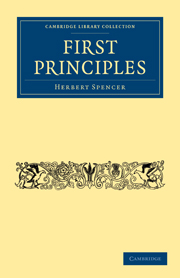Book contents
- Frontmatter
- PREFACE
- Contents
- PART I THE UNKNOWABLE
- PART II LAWS OF THE KNOWABLE
- I LAWS IN GENERAL
- II THE LAW OF EVOLUTION
- III THE LAW OF EVOLUTION (CONTINUED)
- IV THE CAUSES OF EVOLUTION
- V SPACE, TIME, MATTER, MOTION, AND FORCE
- VI THE INDESTRUCTIBILITY OF MATTER
- VII THE CONTINUITY OF MOTION
- VIII THE PERSISTENCE OF FORCE
- IX THE CORRELATION AND EQUIVALENCE OF FORCES
- X THE DIRECTION OF MOTION
- XI THE RHYTHM OF MOTION
- XII THE CONDITIONS ESSENTIAL TO EVOLUTION
- XIII THE INSTABILITY OF THE HOMOGENEOUS
- XIV THE MULTIPLICATION OF EFFECTS
- XV DIFFERENTIATION AND INTEGRATION
- XVI EQUILIBRATION
VII - THE CONTINUITY OF MOTION
Published online by Cambridge University Press: 29 August 2010
- Frontmatter
- PREFACE
- Contents
- PART I THE UNKNOWABLE
- PART II LAWS OF THE KNOWABLE
- I LAWS IN GENERAL
- II THE LAW OF EVOLUTION
- III THE LAW OF EVOLUTION (CONTINUED)
- IV THE CAUSES OF EVOLUTION
- V SPACE, TIME, MATTER, MOTION, AND FORCE
- VI THE INDESTRUCTIBILITY OF MATTER
- VII THE CONTINUITY OF MOTION
- VIII THE PERSISTENCE OF FORCE
- IX THE CORRELATION AND EQUIVALENCE OF FORCES
- X THE DIRECTION OF MOTION
- XI THE RHYTHM OF MOTION
- XII THE CONDITIONS ESSENTIAL TO EVOLUTION
- XIII THE INSTABILITY OF THE HOMOGENEOUS
- XIV THE MULTIPLICATION OF EFFECTS
- XV DIFFERENTIATION AND INTEGRATION
- XVI EQUILIBRATION
Summary
§ 69. Another general truth of the same order with the foregoing, must here be specified—one which, though not so generally recognized, has yet long been familiar among men of science. The continuity of Motion, like the indestructibility of Matter, is clearly an axiom underlying the very possibility of a rational theory of Evolution. That kind of change in the arrangement of parts, which we have found to constitute Evolution, could not be deductively explained were it possible for Motion either to appear or disappear. If those motions through which the parts pass into a new arrangement, might either proceed from nothing or lapse into nothing, there would be an end to scientific interpretation of them. Each constituent change might as well as not be supposed to begin and end of itself.
The axiomatic character of the truth that Motion is continuous, is recognized only after the discipline of exact science has given precision to the conceptions. Aboriginal men, our uneducated population, and even most of the socalled educated, think in an extremely indefinite manner. From careless observations, they pass by careless reasoning, to conclusions of which they do not contemplate the implications—conclusions which they never develope for the purpose of seeing whether they are consistent. Accepting without criticism the dicta of unaided perception, to the effect that surrounding bodies when put in motion soon return to rest, the great majority tacitly assume that the motion is actually lost.
- Type
- Chapter
- Information
- First Principles , pp. 246 - 250Publisher: Cambridge University PressPrint publication year: 2009First published in: 1862



